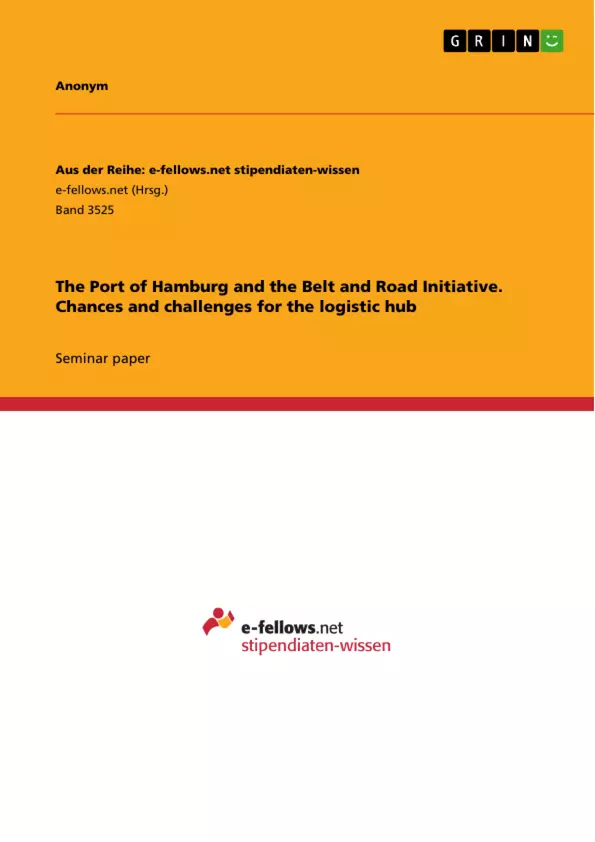This paper focuses on the economic outlook of the Port of Hamburg in general and challenges and chances presented by the Chinese Belt and Road Initiative (BRI) especially. Leading research question is: Is the Port of Hamburg profiting by the BRI or is it risking being left out by this century’s major development program?
Hamburg is a traditional center of European-Chinese trade since 1731, when the first ship arrived from Guangdong province delivering tea, silk and porcelain.Today, 5.900 Chinese citizen are living in the Hanseatic city. More than 550 Chinese companies have their seat in Hamburg, most of them in the logistics, aerospace and energy sector. Amongst others, the stateowned China Ocean Shipping (Group) Company (COSCO), the biggest Chinese shipping company, has its European headquarter in Hamburg. Only in North Rhine Westphalia (1.100) and Hesse (700) are more Chinese companies registered.
In 1986 Hamburg established a twinning agreement with Shanghai, where Hamburg operates the Hamburg Liaison Office (HLO). In 2016 a second dependence opened in Beijing. Furthermore, the north German metropolis is staging the biennial high-level conference “The Hamburg Summit: China meets Europe”, one of the most important fora of Sino-European cooperation.
Economically or politically, the Port of Hamburg is the transmitter of Hamburg’s and Germany’s close ties to China and dominated the EU-China trade together with Dutch and Belgian ports for the last decades. However, changing geopolitical landscapes, namely the introduction of the BRI, challenge the former “top dog”. The Port of Hamburg has to face ongoing pressure from inner-German competitors like Duisburg and ports in the Mediterranean Sea.
Inhaltsverzeichnis (Table of Contents)
- Introduction
- The Port of Hamburg
- China business of the Port of Hamburg
- The Belt and Road Initiative and Europe
- Challenges for the Port of Hamburg – is Chinese trade shifting away to South Europe?
- Chances for the Port of Hamburg – success through new routes?
- Hamburg as major railway port
- Hamburg's interest in the Polar Silk Road
- Policy recommendations
- Conclusion
Zielsetzung und Themenschwerpunkte (Objectives and Key Themes)
This paper examines the economic outlook of the Port of Hamburg in relation to the Chinese Belt and Road Initiative (BRI). It investigates the potential challenges and opportunities presented by the BRI for the Port of Hamburg, considering its historical role as a key player in European-Chinese trade. The paper aims to understand if the Port of Hamburg will benefit from the BRI or be left behind by this major development program.
- The Port of Hamburg's historical significance in European-Chinese trade.
- The impact of the Belt and Road Initiative on trade routes and logistics.
- The potential challenges faced by the Port of Hamburg due to the BRI.
- Opportunities for the Port of Hamburg to capitalize on the BRI.
- Policy recommendations for the Port of Hamburg to navigate the BRI's implications.
Zusammenfassung der Kapitel (Chapter Summaries)
The second chapter, "The Port of Hamburg," provides a detailed overview of the Port of Hamburg, including its business structure, economic performance, and unique shareholder structure. The third chapter, "China business of the Port of Hamburg," delves into the significance of the China business for the Port of Hamburg and its crucial role in German-Chinese trade.
The fourth chapter, "The Belt and Road Initiative and Hamburg," explores the emerging challenges for the Port of Hamburg in the context of the BRI. The chapter examines potential competitors and alternative trading routes, emphasizing the potential impact on the Port's traditional role. The second part of this chapter explores possible opportunities for the Port of Hamburg arising from changes in transportation means.
Schlüsselwörter (Keywords)
The paper focuses on key themes such as the Port of Hamburg, European-Chinese trade, the Belt and Road Initiative, logistics, infrastructure, trade routes, economic development, and policy recommendations.
- Quote paper
- Anonym (Author), 2019, The Port of Hamburg and the Belt and Road Initiative. Chances and challenges for the logistic hub, Munich, GRIN Verlag, https://www.hausarbeiten.de/document/919406


